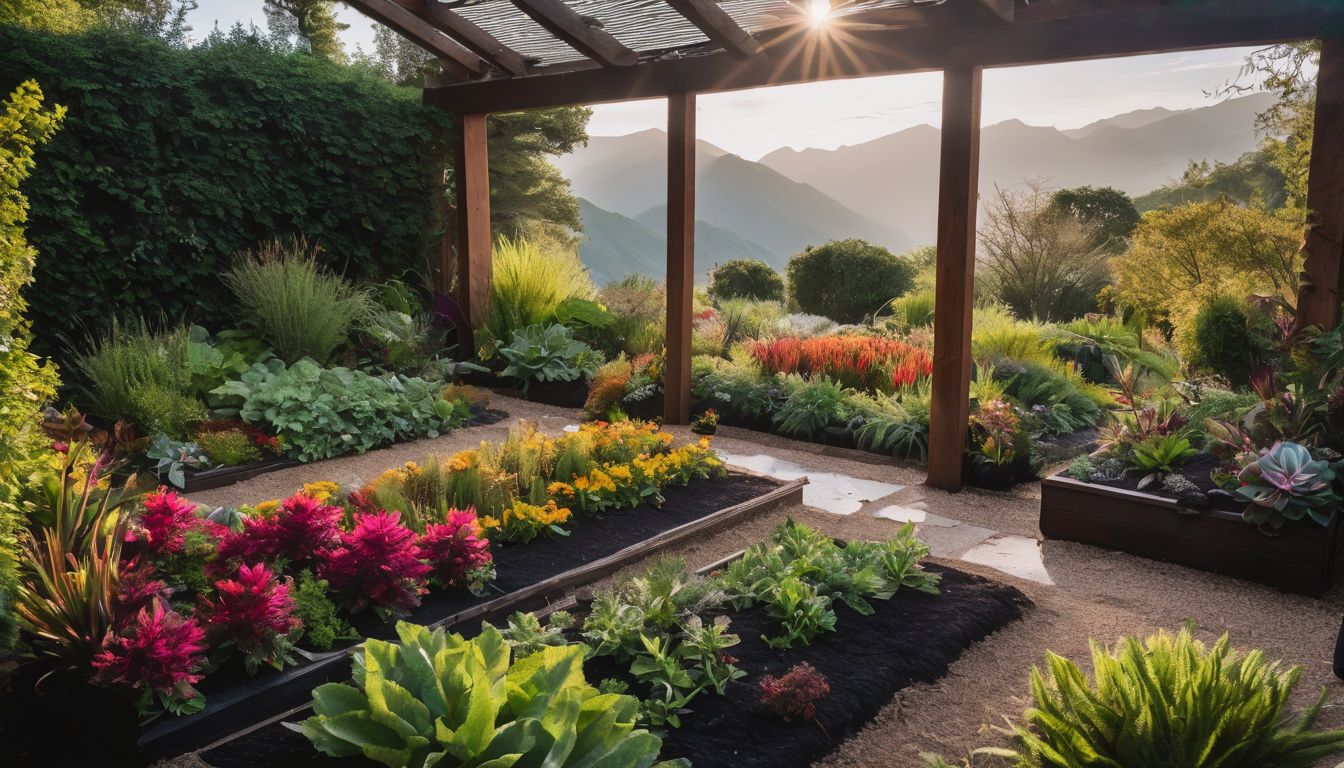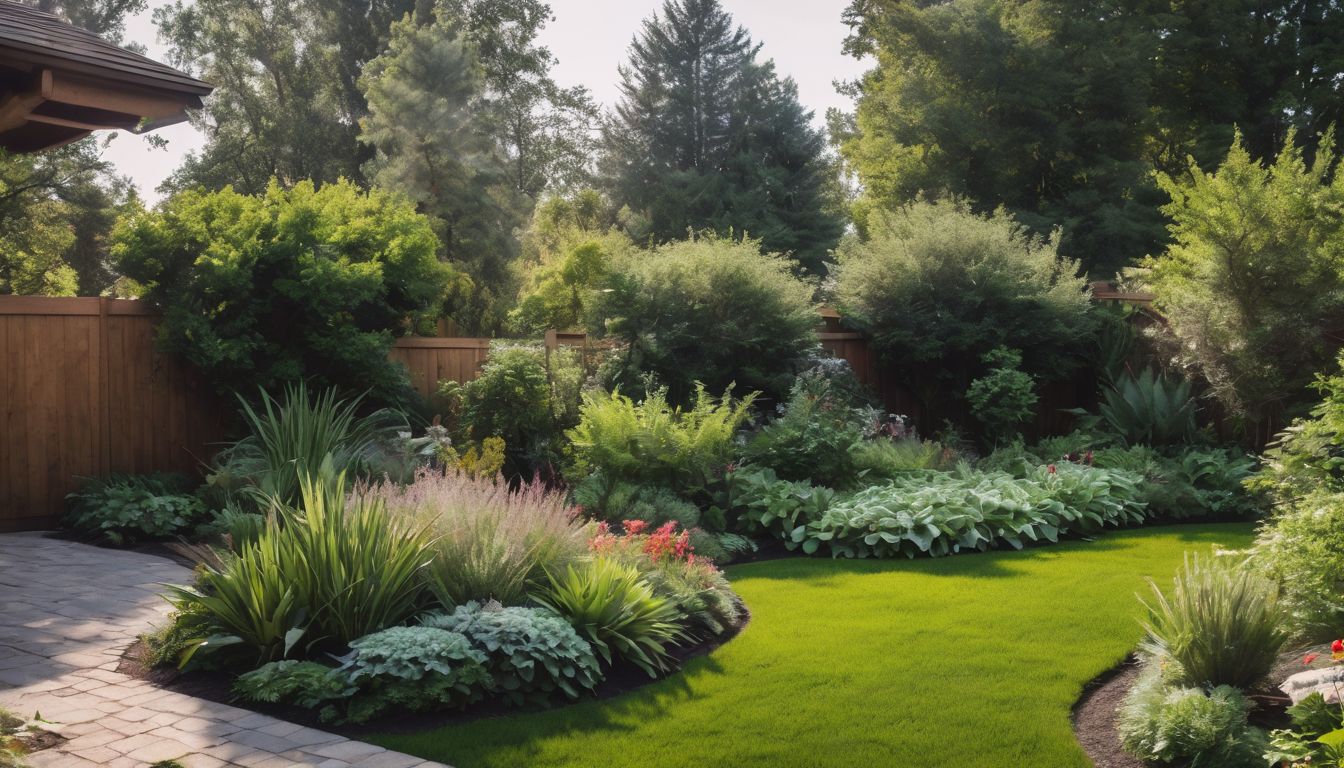Why Choose Organic Gardening?
Organic gardening is beneficial for the environment, as it reduces the use of harmful chemicals and promotes natural ecosystems. It also provides healthier produce for you and your family, free from synthetic pesticides and fertilisers.
Healthier for you and your family
Transitioning from the environmental benefits of organic gardening, incorporating natural and sustainable techniques in your garden also means a healthier environment for you and your family.
By avoiding chemical pesticides and fertilisers, organic gardening reduces exposure to harmful toxins. Choosing organic produce from your own garden ensures that you’re consuming food free from synthetic chemicals, promoting overall health and well-being for both you and your loved ones.
Growing organically also encourages greater nutritional value in fruits and vegetables, promoting a balanced diet rich in essential vitamins and minerals. Additionally, involving your family in the process fosters an understanding of where food comes from while nurturing a healthy relationship with nature.
Natural pest control
To maintain a healthy and thriving garden, natural pest control methods are essential. By introducing beneficial insects such as ladybirds and praying mantises, you can reduce the population of harmful pests without resorting to chemical pesticides.
Additionally, planting companion plants like marigolds or garlic can deter unwanted insects, while using organic repellents such as neem oil or diatomaceous earth can protect your plants without harming the environment.
Implementing these natural pest control strategies will help maintain the delicate balance of your garden ecosystem while promoting sustainable gardening practices for a healthier environment and more abundant harvests.
Preparing Your Garden
When starting your organic garden, it’s important to choose a sunny location and use compost and organic amendments for healthy soil. Selecting suitable plants for your climate and soil type is also crucial for a successful organic garden.
Choosing a sunny location
When choosing a sunny location for your organic garden, look for an area that receives at least 6-8 hours of direct sunlight each day. This will help your plants thrive and produce a bountiful harvest, as most vegetables and fruits require ample sunlight to grow.
Opting for a well-lit spot in your garden can also help reduce the risk of diseases that thrive in damp, shaded areas.
Ensuring your garden flourishes in a sunny location is essential to maximise growth potential and yield healthy, nutritious produce. By selecting the right sun-soaked spot, you are setting the stage for successful organic gardening practices.
Using compost and organic amendments
- Compost enriches the soil with essential nutrients, improves soil structure, and retains moisture.
- Organic amendments such as aged manure, bone meal, or fish emulsion provide a slow – release source of nutrients for plants.
- They help balance soil pH levels and promote beneficial microbial activity in the soil.
- Incorporating these organic materials into the garden bed creates a healthy environment for plant growth and development.
- This sustainable approach reduces dependence on synthetic fertilisers and supports a natural ecosystem within your garden.
Selecting suitable plants
To ensure a successful organic garden, consider the following factors when selecting plants:
- Opt for native plants that are well-suited to your local climate and soil conditions, reducing the need for excessive watering or soil amendments.
- Choose plant varieties that are naturally resistant to common pests or diseases, minimising the need for chemical interventions.
- Prioritise perennial plants that require less frequent replanting and maintenance, promoting long-term sustainability in your garden.
- Select a diverse range of plants to support local biodiversity, attracting beneficial insects and pollinators while naturally balancing the ecosystem.
Maintenance and Care
Rotate crops to prevent soil depletion, use natural repellents for pests, and water wisely to ensure a thriving organic garden. Read on to learn more about maintaining a healthy garden naturally.
Rotating crops
Rotating crops helps maintain soil fertility and reduces the risk of pests and diseases. This practice involves planting different types of crops in a specific order over the seasons.
- Enhances soil health: Rotating crops prevents depletion of specific nutrients in the soil, promoting balanced and fertile ground for future plantings.
- Pest and disease control: Alternating crop types disrupts pest life cycles and reduces the buildup of pathogens in the soil, lowering the need for chemical interventions.
- Weed suppression: Rotating crops can help reduce weed growth, as different plants have varying root systems that can help break up weed-friendly conditions.
Natural repellents for pests
- Introduce beneficial insects like ladybirds, lacewings, and predatory mites to control aphids and other harmful insects in your garden.
- Plant insect – repelling herbs such as basil, mint, and lavender among your crops to deter pests naturally.
- Create a barrier with crushed eggshells or diatomaceous earth to protect plants from slugs and snails without harming the environment.
- Use neem oil spray to combat fungal diseases and repel common garden pests without resorting to chemical pesticides.
Watering wisely
After implementing natural repellents for pests, it’s essential to also practice watering wisely in your organic garden. Conserving water and ensuring proper hydration for your plants can be achieved through mindful irrigation methods.
One way to do this is by using a drip irrigation system which targets the roots directly, minimising water wastage. Another method is mulching, which retains moisture in the soil, reducing the need for frequent watering.
Additionally, incorporating rainwater harvesting into your gardening routine can significantly reduce water consumption from traditional sources. Collecting rainwater in barrels or cisterns allows you to use natural resources efficiently and sustainably for your garden, promoting eco-friendly gardening practices while maintaining a healthy and vibrant outdoor space that benefits both your family and the environment.
Maximizing Your Space
Utilise small spaces effectively by implementing vertical gardening techniques, allowing for more plants to thrive in limited areas. This sustainable approach maximises your garden’s potential while minimising its ecological footprint.
Growing in small spaces
- Utilise vertical gardening to grow plants upward, such as using trellises or hanging baskets.
- Opt for compact varieties of vegetables and herbs that are specifically bred for small spaces.
- Consider using raised beds or containers to maximise the use of available space.
- Use intercropping techniques, planting different types of plants together in the same area, to optimise space and soil nutrients.
- Make use of walls and fences by installing pocket planters or vertical gardens to grow plants vertically.
Vertical gardening
- Use trellises or arbours to grow climbing plants such as tomatoes, cucumbers, and beans.
- Consider installing wall – mounted planters for herbs and small vegetables.
- Utilise hanging baskets for strawberries, trailing flowers, and herbs.
- Explore the option of vertical hydroponic systems for space-saving and efficient growth.
- Incorporate vertical pallet gardens for a rustic and functional design element.
- Create a living wall with modular planting systems for a striking visual display.
Conclusion
Incorporate organic gardening into your routine for a greener and healthier garden. Embrace sustainable techniques to nurture the environment and benefit your family’s health. Implement chemical-free methods, maximising space while supporting conservation efforts.
FAQs
1. What are the best natural gardening tips for a healthy garden?
Use sustainable gardening techniques like composting, choosing native plants, and controlling pests with non-toxic methods to keep your garden thriving without harming the environment.
2. How can I make my gardening more eco-friendly?
To embrace ecofriendly gardening advice, avoid chemical fertilisers or pesticides, conserve water with drip irrigation systems, and invite beneficial wildlife into your space.
3. Why should I consider chemical-free gardening methods?
Chemicalfree gardening methods protect your health and the ecosystem by preventing potentially harmful substances from entering our soil and water supply while promoting biodiversity in your garden.
4. Can you give some environmentally friendly practices for beginners?
Start with earthfriendly advice like using organic seeds, implementing green composting tips to enrich soil naturally and adopting holistic nonchemical techniques that encourage natural growth and resilience in plants.





